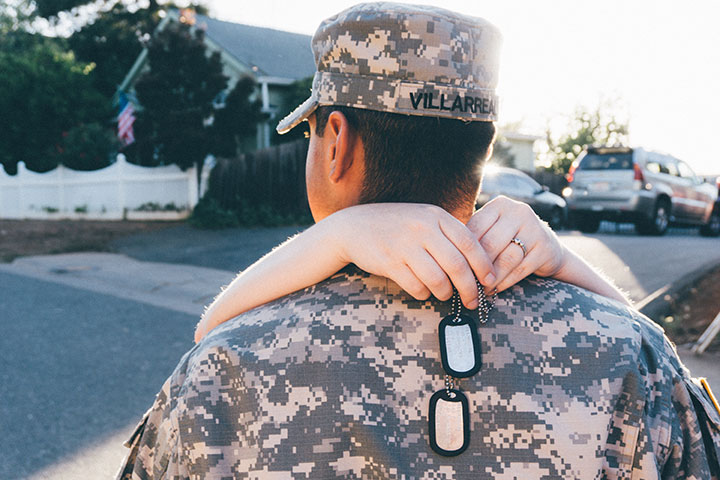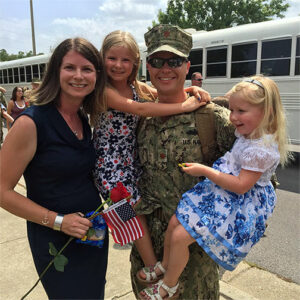 ERIKA
ERIKA
Michelle says, “The hardest part is trying to explain to my two girls, ages 7 and 4, why Daddy isn’t here and why he has to leave. They see their cousins’ parents who don’t leave for six months and come back home. There is really no good answer except to say, ‘Daddy loves you, and it is important that he goes away.’”
Like others in her situation Michelle stays active and takes advantage of the many resources available for families of the deployed. FOCUS* — Families Overcoming Under Stress — is based on over 20 years of research with children and families facing challenges and adversities in many different settings.
Michelle explains, “They have therapists and counselors the girls can meet with and talk through the frustrating moments of missing their dad.”
Being a military spouse has given Michelle insight into her own life and objectives. Describing herself as a “goal digger,” Michelle says, “My career path is an obstacle course that dips into muddy waters and rises up to steep rope climbs. By being a goal digger, I own my career path. I’m forging it every day.”
Volunteering as co-chair for the local chapter of In Gear Career for Military Spouses, as well as an advisor for a family readiness group, Michelle is also a freelance writer and managing editor for NextGenMilspouse.com and other publications.
“I write about how husbands and wives are holding it together while apart,” she says. “But the nights are a challenging time for my girls when they need extra cuddles and stories.” That’s why the Volkmanns schedule weekly FaceTime on Sunday afternoons while the children eat lunch. “I miss him the most on their birthdays,” Michelle says.
She adds her anxiety levels and fears were at their highest when Benny was in Iraq for nine months in 2007. “I was 26 years old, no children at the time. I drank wine and cried a lot.” That’s why today Michelle says she cannot afford to be a very emotional person in the day-to-day. “I have to keep moving forward until he gets home.”
In spite of the longing Michelle and the girls remain positive in what she describes as a “life of constant transitions,” which have provided them a broad range of experiences, cultures, and countries as a family. She says she finds the joy in military life because her husband loves the Navy, and she loves her husband. Like so many military wives, friendships remain the key to sanity.
“Reach out to the community that is around you,” Michelle advises. “Meet other military wives and find that one person who you can call in the middle of the night, who will drive you to the ER, jumpstart your car, or take your children for the day when you are sick. That is the person who will get you through. And, remember every night that goes by is one day closer to your husband coming home.”
 MOLLY
MOLLY
Molly is not only a military wife, but an Army veteran herself. At age 19 she joined the reserves and was called into active duty after the September 11 attacks on the United States.
“It was incredibly difficult,” Molly says in a soft and understated tone. “I had just met my husband and was chomping at the bit to get home and go to grad school. Next thing you know I am stuck in Kuwait with no idea of when I would be coming back to the U.S.” Unfortunately, like so many of the troops, Molly suffered post-traumatic stress syndrome. Her journey to healing was long and painful. She eventually earned her master’s degree in business administration and married the man of her dreams.
Though she still struggles with health issues, today Molly is happily married with a son in second grade, a daughter in kindergarten, and an Air Force husband stationed for
the next year or more in what she describes as a “remote, hostile, and undisclosed location of Europe.” Upon first learning about his new duty station, Molly says it was like having whiplash.
“I was in an angry stupor for the first week, saying this is not really going to happen. It’s a really bad prank.”
She decided immediately to pull in and determine her priorities for her family. That meant giving up a lucrative position as a financial professional.
“I stepped away from a 100-percent commission in my role, but it takes so much to run the house and to be here completely for my children,” Molly explains. “I cannot have anything else on me, like a full time job. There is just so much uncertainty in my world right now.”
Molly has developed constructive coping mechanisms to deal with the many months her husband is overseas. She is helping her children to do the same.
“They throw their shoes and start screaming. They are experiencing pain from their father’s absence and they don’t have the internal understanding to draw that correlation,” Molly says. “I enrolled both children in a martial arts program three times a week. Also, we are about to start the FOCUS program.”
For Molly volunteer work has been rewarding, and being with other military wives who understand is rejuvenating for her.
“I am finding a new rhythm. I love to entertain at home over the holidays, so I will still try to do that.” Her mother-in-law being in town is a godsend for Molly as well. “She is staying for six months and we garden and do other things together.”
For Christmas Molly is planning to visit her mother in Florida and her brother in South Carolina. However, her October 18 wedding anniversary was a keen reminder that “her favorite person in the world” is not nearby. “I cannot crawl in bed with him and fall asleep with my skin blanket,” Molly says sadly. Yet her wisdom about her friendships with others in the same predicament shines through.
“If I thought for one minute I was doing this alone I would be a wreck, but friends ask me how I’m doing. They call to give me a break and even tell me to make a list of the jobs I need done around the house. Knowing they are there is a lifesaver.”
Read more of the Women on the Line series here.
Special thanks to Allen Toyota for sponsoring Women on the Line, a three-part series recognizing women answering the toughest challenges in their communities.



 MICHELLE
MICHELLE